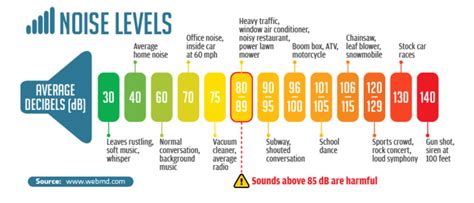When it comes to understanding noise pollution, decibels (dB) are an important measure. This unit of measurement describes the levels of loudness. Generally, the higher the dB levels, the louder the sound. Understanding what 95 dB sounds like can help you take the necessary steps to protect your hearing.
For a sound to reach the level of 95 dB, it must be as loud as a jackhammer or power lawn mower. This is loud enough to cause sudden hearing damage after only 15 minutes of exposure, according to the Centers for Disease Control and Prevention. For every 3 dB increase in sound, the sound energy doubles.
Noise pollution can come from a variety of sources, including traffic, construction sites, and music venues. Exposure to sounds over 90 dB can put you at risk for hearing loss. Long-term exposure to noise pollution can cause hearing damage, as well as headaches and sleep disturbances.
If you’re frequently exposed to 95 dB or louder, it is important to take steps to protect your hearing. Wear ear protection when you’re in loud environments, such as concerts or construction sites. If you’re at a concert, you should also make sure to take breaks between songs or if the volume becomes too loud.
You should also take frequent breaks when you’re working with machinery or power tools that produce loud noises. If you’re concerned about noise pollution in your area, consider using soundproofing materials to reduce the impact of loud noises on your home or office. You can also reach out to your local government to see what noise ordinances are in place in your area.
Being aware of what 95 dB sounds like and taking steps to protect your hearing can help you avoid dangerous levels of noise pollution. Make sure to wear ear protection when you’re in loud environments and take frequent breaks. You can also use soundproofing materials to reduce the impact of noise pollution in your home or office.
What is a 95 Decibel Sound?
Have you ever wondered what a 95 decibel sound is? Or, more specifically, what does 95 decibels sound like? Well, this article will explain what a 95 decibel sound is and what it sounds like.
A decibel (dB) is a unit of measurement for sound intensity. A decibel is used to measure how loud something is. Generally speaking, a decibel is one-tenth of a bel, which is named after Alexander Graham Bell. A decibel is an exponential unit of measurement, which means that each increase of 10 dB doubles the sound pressure. So when the sound intensity is 10 dB, it is twice as loud as when the sound intensity is 0 dB.
So what does 95 decibels sound like? It is difficult to describe because the sound of 95 decibels can vary depending on what is making the noise. Generally speaking, 95 decibels is a loud sound, similar to a lawnmower, a vacuum cleaner, or a motorcycle. It is loud enough to cause hearing damage if it is sustained over a long period of time. The following table provides an overview of what 95 decibels sounds like:
| Sound | dB |
|---|---|
| A lawnmower | 95 dB |
| A vacuum cleaner | 95 dB |
| A motorcycle | 95 dB |
| A chainsaw | 95 dB |
| A hand drill | 95 dB |
It is important to note that 95 decibels is on the higher end of the decibel scale. It is important to take safety precautions and wear hearing protection when working with or near sounds of 95 decibels or louder.
What Does 95 Decibels Sound Like?
Sounds are measured in decibels, and 95 decibels is a fairly loud sound. To put it into perspective, 95 decibels is roughly equivalent to the sound of a loud alarm clock, a lawn mower, or a motorcycle passing by. This level of sound may be uncomfortable for some people, and prolonged exposure to a sound at this level can cause hearing damage.
Some common sources of 95 decibel sounds include factory machines, power tools, live music, and car horns. Factory machines, such as those used in the manufacturing industry, can produce noise levels of up to 95 decibels. Power tools, such as chainsaws or sledgehammers, can also be very loud, and may produce this level of sound. Live music, such as concerts or shows, can also be at this level of sound, especially when amplified. Car horns, when honked for a prolonged period, can also reach this decibel level.
It is important to note that the decibel level can be subjective. For example, what one person may find to be an acceptable level of sound, another person may find to be uncomfortable or even painful. It is important to be aware of your environment and the potential health risks associated with prolonged exposure to loud noises.
In order to protect your hearing, it is recommended that you avoid prolonged exposure to sounds over 85 decibels. For further protection, consider investing in a pair of earplugs or earmuffs that can reduce the decibel levels of sound. It is also important to take regular breaks when exposed to loud noises in order to give your ears a chance to rest.
Decibel is a unit used to measure the intensity of a sound.
95 decibels is considered to be very loud.
95 decibels sound like a loud roaring or banging noise.
A 95 decibel is much louder than a normal conversation.
Some sounds that are around 95 decibels include an alarm clock, a motorcycle, and a hair dryer.
You should not stay exposed to 95 decibels for extended periods of time as it can damage your hearing.
Yes, prolonged exposure to 95 decibels can lead to hearing loss.
The maximum safe level of decibels is 85 decibels.
Yes, some types of music can reach up to 95 decibels.
No, despite becoming less noticeable, exposure to 95 decibels can still cause hearing damage.






